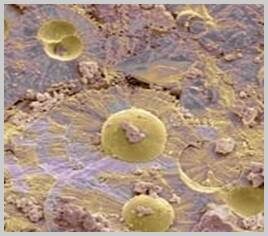
Bladder Stones
Bladder stones are hard, crystallized growths that form in the bladder. They can occur when the urine in the bladder does not empty well and causes the minerals and proteins contained in it to crystalize. Bladder stones may be the result of the bladder not emptying completely during urination, which may be due to prostate enlargement, nerve damage or recurring urinary tract infections.
Causes of Bladder Stones
When urine within the bladder stays in the bladder, bladder stones can develop as the urine becomes concentrated, causing minerals and proteins in the urine to crystallize. Bladder stones are less common than kidney stones. Males are more commonly affected, especially those who have an enlarged prostate, frequent urinary tract infections, or obstruction of the urinary tract. Diet and the lack of fluid intake can also be a factor in the development of bladder stones.
Symptoms of Bladder Stones
Common symptoms of bladder stones include abdominal pain, painful urination and blood in the urine. Other symptoms may include:
• Urinary frequency
• Difficulty urinating especially initiating stream
• Incontinence
• Abnormally dark urine
• In males, penile pain or discomfort
Diagnosis of Bladder Stones
Bladder stones are diagnosed through a physical examination and may include the following tests:
• Urinalysis
• Blood tests
• Imaging studies including CT scan or ultrasound
• Cystoscopy (looking inside the bladder with a camera)
Treatment of Bladder Stones
Different treatment options may be recommended based on the size of the bladder stones. There are different options available and may include the following:
Increased Fluid Intake
If the stones are small, it may be recommended to increase fluids by drinking 8-10glasses of water every day. This helps to increase urine production which may help flush out the stones particularly if they are small
Cystolitholapaxy
A cystolitholapaxy is a common procedure performed to treat bladder stones. Using a cystoscope, a small camerais passed through the urethra to the bladder and a laser may be used to break up the stones so they will pass through the bladder. They are generally sent for analysis to determine composition
Surgery
Bladder stones that are too large or difficult to break up, may be removed by a surgical incision into the bladder. The doctor makes an incision in the bladder and directly removes the stones.
If bladder stones are left untreated, they may cause repeated urinary tract infections or permanent damage to the bladder or kidneys.
Prevention of Bladder Stones
While all bladder stones cannot be avoided, drinking plenty of fluids, especially water, may help prevent them by diluting the concentration of minerals in the bladder. Frequent urination and not holding urine for long periods may help to prevent bladder stones by emptying the bladder. Prompt treatment of urinary tract infections or other urinary tract conditions may also help to prevent bladder stones.
